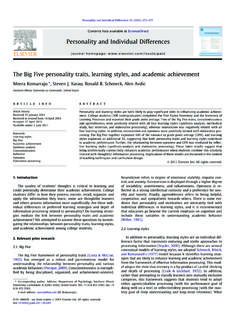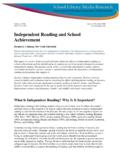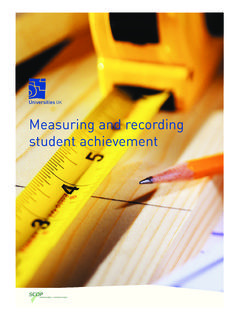Transcription of The link between Social and Emotional Learning …
1 The link between Social and Emotional Learning and academic AchievementOver the past decade, education has become increasingly held accountable for raising academic standards through measures such as standardised testing in the core curriculum subjects. Many teachers find themselves under increasing pressure to meet external requirements, with the result that curriculum time for subjects where little accountability is required is frequently undermined. A common critique of the Social and Emotional curricula is that they focus time and energy on Social and behavioural goals at the expense of academic Learning . In such a climate, it becomes important for the Social and Emotional curricula to demonstrate their impact on academic performance. Social and Emotional Learning is defined as the process through which we recognise and manage emotions, establish healthy relationships, set positive goals, behave ethically and responsibly and avoid negative behaviours (Elias et al.)
2 , 1997; Payton et al., 2000). Within the context of schools, Social and Emotional Learning (SEL) involves the integration of two interrelated strands to promote successful school performance and youth development: (i) skills development and (ii) supportive environments. First, through evidence based classroom programmes such as Zippy s Friends, Social and Emotional skills are explicitly taught, practised and applied to diverse situations so that students internalise them as part of their repertoire of behaviours. These skills and attitudes help students feel motivated to succeed, to believe in their success, to communicate well with their teachers, to set academic goals, to organise themselves to achieve these goals, to overcome obstacles. The second component is the development and maintenance of a safe, supportive Learning environment where (i) children feel cared for and respected, and (ii) adults model and provide opportunities for them to practice and apply SEL skills both in class and throughout the school.
3 Communication styles, high performance expectations, classroom structures and rules, school organisational climate, commitment to the academic success of all students, and openness to parental and community involvement are all necessary for the successful creation of a supportive Learning environment (Greenberg et al., 2003; Zins et al., 2004). The Collaborative for academic , Social and Emotional Learning (CASEL) illustrates the connection between Social and Emotional Learning and improved academic performance (see Fig 1). Based on a review of the evidence, CASEL contends that SEL interventions and skill development should be taught within a supportive Learning environment and should also contribute to the enhancement of such a climate. These enablers in turn lead to positive child development and greater attachment and engagement in school.
4 The final outcome is improved academic performance and school success (Zins et al, 2004). The Link between Social and Emotional Learning and academic achievement - Aleisha M. Clarke & Professor Margaret M. Barry1 Evidence based SEL programmingTeach SEL competencies Self awareness Social awareness Self management Relationship skills Responsible decision makingProvide opportunities and reward for positive behaviourDevelop safe, caring, cooperative, well-managed participatory Learning environmentsLess risky behaviour, more assets and positive developmentGreater attachment, engagement and commitment to schoolImproved academic performance and school successFig 1: Adapted from CASEL (2003) The role of Social and Emotional Learning in academic achievement Evidence There is a growing interest in examining the link between Social - Emotional functioning and academic achievement .
5 Several authors have examined the effect of SEL programmes on children s academic outcomes, including school grades and standardised achievement test scores. In 2008, Payton and colleagues undertook the largest and most rigorous assessment of the impact of school-based SEL programmes on children. This report, which has been hailed as one of the most critical and potentially influential pieces of work to emerge in recent years, concludes that evidence-based programmes are intimately linked to improving children s academic performance. This meta-analytic review included 317 studies involving 324,303 school children age 5-13 years. The results from this review are very impressive. Compared to students in the control groups, children participating in SEL programmes demonstrated improvements in multiple areas including: enhanced Social and Emotional skills improved attitudes towards self, school and others enhanced positive Social behaviour reduced conduct problems misbehavior and aggression reduced Emotional distress stress and depression improved academic performance test scores and school grades.
6 The Link between Social and Emotional Learning and academic achievement - Aleisha M. Clarke & Professor Margaret M. Barry2 The results from this review indicate that in addition to improving students Social and Emotional skills, these SEL programmes also significantly improved children s academic performance. Notably, SEL programming yielded an average gain on achievement test scores of 11 to 17 percentile points. These results suggest that SEL programmes have the potential to elevate a child performing at the 50th percentile in terms of their school achievement ( doing better academically than 49 percent of their peers) to the 61st percentile ( doing better academically than 60 percent of their peers) an 11 percentile rise. In discussing the significance of these findings for schools, Payton states: Although some educators argue against implementing this type of holistic programming because it takes valuable time away from core academic material, our findings suggest that SEL programming not only does not detract from academic performance but actually increases students performance on standardised tests and grades.
7 The study also found that only when school staff conducted the intervention did students academic performance improve significantly. This implies that the direct involvement of teachers and school staff is critical if programmes are to translate improvements in children s Social and Emotional skills into so-called hard academic outcomes. In terms of the characteristics of successful programmes, Payton and colleagues found that interventions using four recommended practices for skills training ( ) were the most effective: Sequenced: programme applies a planned set of activities to develop skills sequentiallyActive: programme uses active forms of Learning such as role plays and behavioural rehearsal with feedbackFocused: programme devotes sufficient time to developing Social and Emotional skillsExplicit.
8 Programme targets specific Social and Emotional is interesting to note that Zippy s Friends uses all four of these recommended practices in developing the coping and Social skills of young results from this comprehensive review provide clear and compelling evidence of the significant positive effect that SEL programmes have on children s academic achievement . SEL programmes not only improve Social and Emotional outcomes but also improve skills which are vital for children s academic performance. This is particularly noteworthy in this era of accountability and teachers concerns about raising academic standards. Furthermore, Greenberg (2003) states that Learning Social and Emotional skills is similar to Learning other academic skills in that the effects of initial Learning are enhanced over time to address the increasingly complex situations children face regarding academic achievement , Social relationships, citizenship and health.
9 In addition, several reviews of universal SEL programmes found evidence of greater effectiveness in the early years (ages 2-7) than in older children (Tennant et al., 2007; Browne et al., 2004). Taken together these findings highlight the need for schools to embrace their role in promoting Social and Emotional Learning from an early age in primary schools, and to adopt a spiral approach that builds on what has been learned as children progress through primary school into secondary school. Aleisha M. Clarke & Professor Margaret M. BarryHealth Promotion Research Centre, National University of Ireland GalwayThe Link between Social and Emotional Learning and academic achievement - Aleisha M. Clarke & Professor Margaret M. Barry3 References(Browne, Gafni, Roberts, Byrne, & Majumdar, 2004; Elias, et al.)
10 , 1997; Greenberg, et al., 2003; J. Payton, et al., 2008; J. W. Payton, et al., 2000; Tennant, Goens, Barlow, Day, & Stewart-Brown, 2007; Zins, Weissberg, Wang, & Walberg, 2004)Browne, G., Gafni, A., Roberts, J., Byrne, C., & Majumdar, B. (2004). Effective/efficient mental health programs for school-age children: a synthesis of reviews. Social Science & Medicine, 58(7), , M. J., Zins, J. E., Weissberg, R. P., Frey, K. S., Greenberg, M. T., Haynes, N. M., et al. (1997). Promoting Social and Emotional Learning : Guidelines for educators. Alexandria, VA: Association of Supervision and Curriculum , M., Weissberg, R., O Brien, M., Zins, J., Fredericks, L., Resnik, H., et al. (2003). Enhancing school-based prevention and youth development through coordinated Social , Emotional , and academic Learning .




